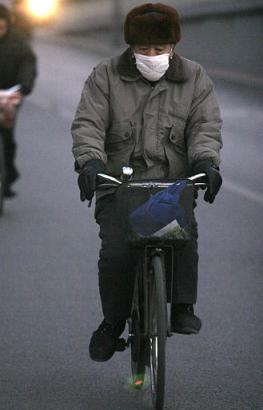China praised on suspected SARS response
( 2004-01-03 14:24) (Agencies)
The World Health Organization lauded medical officials in southern China for their efforts to determine whether a sickened man has SARS — praise that was welcomed Saturday by the nation initially denounced for once sluggish response to the disease.

A Chinese man wearing a mask cycles in the late afternoon on the streets of Beijing Friday, Jan. 2, 2004. Genetic tests on a suspected SARS case in southern China show that a patient 'may possibly' have the disease, the government said Friday, as Hong Kong scientists joined the international effort to solve the mystery of whether the man is infected. [AP] |
Tests on the pneumonia patient, a 32-year-old television producer from Guangdong province, remained inconclusive Saturday as researchers in Hong Kong continued to examine his samples. If he is confirmed to have SARS, it would be China mainland's first new case since July.
Results were not expected before Monday, according to a statement issued late Friday night by WHO's Beijing office, which said it is withholding judgment until it examines the outcome of an antibody exam called a "virus neutralization test."
Calls to WHO Beijing spokesman Roy Wadia on Saturday rang busy.
WHO, which has spent months delicately balancing its investigations of SARS in China and its relations with the Chinese government, made a point of highlighting the cooperation of Guangdong health officials in its statement.
"The experts praised the Guangdong provincial government in its efforts to deal with the suspected SARS case," WHO said. "WHO believes that this is an example of China's willingness to control SARS and be a full partner in the international health reporting system."
In recent months, the government has promised an aggressive monitoring system and has taken pains to issue frequent updates about the efforts.
The world's first case of what would come to be known as SARS was recorded in Guangdong in November 2002. SARS, a flu-like illness, killed 349 people on China's mainland and a total of 774 around the world. More than 8,000 were sickened worldwide.
The patient's illness — if it is indeed SARS — might be marginally different — "a virus variation with (a) new sequence," Xinhua said, quoting Guangdong's Center for Disease Prevention and Control.
The center emphasized that the findings were extremely preliminary, and WHO made no mention of such a discovery.
|